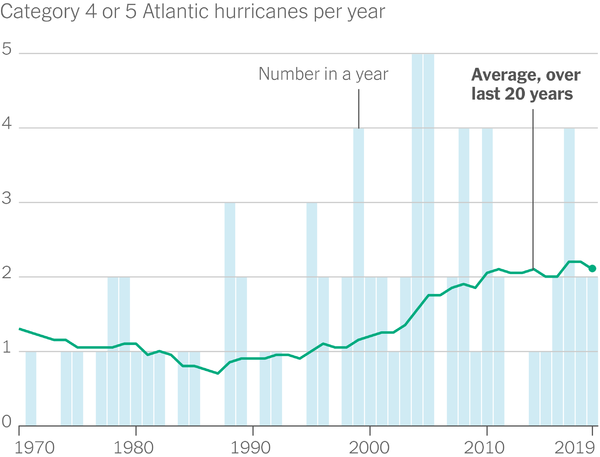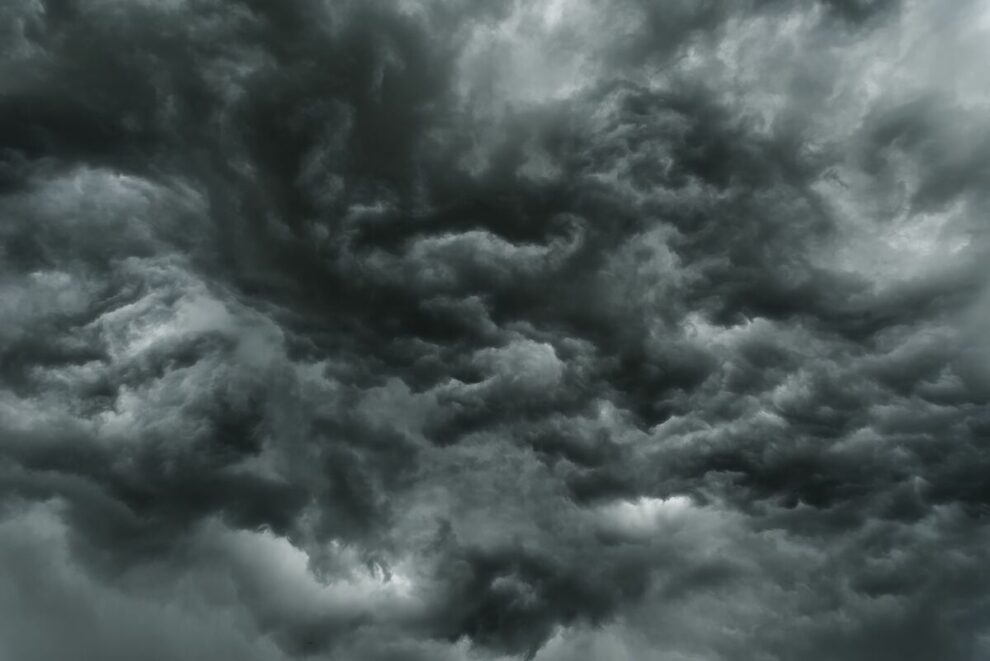As we noted last week, many commentators asserted without foundation that the one-two punch of Hurricanes Marco and Laura was “unprecedented”. Now the New York Times has changed its story entirely. David Leonhardt’s August 27 “The Morning” said well duh “The warming of the planet doesn’t seem to have increased the frequency of hurricanes. But it has increased their severity, scientists say.” And to think just a decade or so ago, during the long hiatus in hurricanes making American landfall, the unnamed shadowy collective of scientists who say were confidently proclaiming that global warming was reducing their severity due to increased wind shear. Once again the trick seems to be to see what just happened, declare it a trend, and retropredict it or claim someone else did. But real predictions concern the future. Like: The Times will continue to claim that they definitely saw whatever bad thing happened coming in the climate-change rear-view mirror.
The Times story contains other standard climate jiggery-pokery including the now-you-don’t-see-it-now-you-do trope: “No single storm is solely a result of climate change, of course. Yet climate change is leading to more storms like Laura.” Which sets up a graph purporting to demonstrate that climate change has caused an increase in Category 4 or 5 Atlantic hurricanes in the last 20 years by using a sliding 20-year average but if you look only at the last quarter-century in their graph the trend is clearly flat or even down.

Source: New York Times
Which as too often begs a crucial question: When exactly do they think the pernicious effects of climate change kicked in? If rising CO2 is creating an accelerating pace of change, we should not be seeing effects in the 1990s that taper off as you approach 2020. (Nor, presumably, should the severity of hurricanes have been falling from 1970 as CO2 and temperature rose.)
Furthermore, as we have pointed out, if you look farther back in time the intensity of hurricanes hasn’t changed since 1900. And Roy Spencer presented evidence from National Hurricane Center data on all the hurricanes affecting Louisiana since before the American Civil War that there has been “no long-term increase in either the number of hurricanes or their intensity since 1851.” It seems the Times is cherry-picking time-frames, as alarmists too often do, as well as effects. And getting a pretty moldy crop.
The same day as Leonhardt’s piece opinion writer Charlie Warzel snootily declared that the “information wars” generally and the 2020 Republican National Convention in particular convinced him that “a meaningful percentage of Americans live in an alternate reality powered by a completely separate universe of news and information… where the existential dangers of climate change pale in comparison to those of cancel culture — even as the West is ravaged by blackouts and wildfires and the Gulf Coast is slammed by a devastating hurricane.” Well, columnist heal thyself, because Leonhardt’s claim of increasing brutality, and Warzel’s more generalized arm-waving, don’t even really fit recent events.
As NBC admitted while working hard to hype it, Laura weakened rapidly after making landfall as the strongest hurricane since 1856 (before AGW) and “The storm surge topped 10 feet in parts of western Louisiana, far less than the maximum prediction of 15-20 feet” that was hyped as “unsurvivable” until it didn’t happen. And Marco had petered out to a tropical storm before even making landfall.
So, stronger storms that aren’t. That’s what “experts say”? But then how to explain National Geographic’s explanation on August 26: “Not one but two tropical storms bore down on the Gulf of Mexico this week. While Tropical Storm Marco lashed Louisiana with heavy rain on Monday, Hurricane Laura brought damaging floods to the Caribbean and is expected to make landfall early Thursday in Louisiana or Texas as a category three tempest. (Pictured above, people being evacuated from Lake Charles, Louisiana.) Having two named storms in the Gulf so close together is very unusual, but perhaps it’s not that surprising to climate scientists, who forecast that 2020 would be an especially active year in the Atlantic, in part due to climate change making storm-forming weather conditions more extreme.”
So climate change does cause more hurricanes? Could you just pick a position and stick to it for, oh, say, a month while we attempt to debate it?
While you’re playing Twister over cyclones, we would like to note that while they hit hard and there were deaths, these storms took far fewer human lives than such events have done historically, and yes they have occurred throughout history, recorded and otherwise, and than they still do in less wealthy countries, because the United States has an advanced economy with advanced emergency preparation and response capabilities. One more reason not to sacrifice economic growth on the basis of a panic whose foundations shift kaleidoscopically while its superstructure always leans ominously in the same direction.



According to Lomborg the COST of US hurricanes isn't rising either if the same historical hurricanes hit the US today. Though present day hurricanes cost more even when the cost of historical hurricanes is translated in to 2019 dollars, this isn't due to an increase in severity, it's due to the huge coastal population & building increase in hurricane susceptible areas.